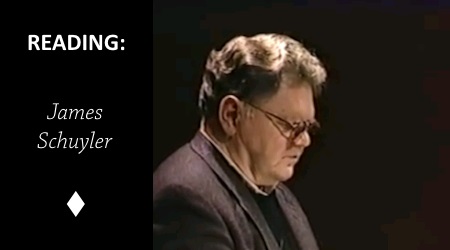James Schuyler (1923-1991) was an American poet, central figure of the New York School, close to Frank O’Hara and John Ashberry. The man, who had worked as a secretary to W.H. Auden, also won a Pulitzer Prize for his collection The morning of the poem. I read a poem about a flour in dour October, because it is a day like that.
The Bluet
And is it stamina
that unseasonably freaks
forth a bluet, a
Quaker lady, by
the lake? So small,
a drop of sky that
splashed and held,
four-petaled, creamy
in its throat. The woods
around were brown,
the air crisp as a
Carr’s table water
biscuit and smelt of
cider. There were frost
apples on the trees in
the field below the house.
The pond was still, then
broke into a ripple.
The hills, the leaves that
have not yet fallen
are deep and oriental
rug colors. Brown leaves
in the woods set off
gray trunks of trees.
But that bluet was
the focus of it all: last
spring, next spring, what
does it matter? Unexpected
as a tear when someone
reads a poem you wrote
for him: “It’s this line
here.” That bluet breaks
me up, tiny spring flower
late, late in dour October.
The language reminds me somewhat of Auden’s craftmanship. I like the opening, ‘freaks forth’, the cool little flower that stands by the lake like a Quacker lady. The crisp air (the comparison to a table water biscuit is not my taste) smelling of cider, the autumnal foliage and the gaze moving from the leaves still on the trees to the dead gray tree trunk. Set off: to compensate, or to put in motion. The dead leaves spur the mushroom growth, one organism’s death is another’s survival. Indeed, what does it matter, last spring, next spring?
As long as the four-petaled lucky bluet stands, like that one unexpected (unforeseen) moment when you read a beautiful poem. When the poet says the bluet ‘breaks him up’. Again (and perhaps this is because I do the reading with foreign eyes) an ambiguous phrasal verb. Does it ‘crack him up’? Or disintegrate, disorientate hem?

One thought on “Reading: The Bluet by James Schuyler”
Comments are closed.